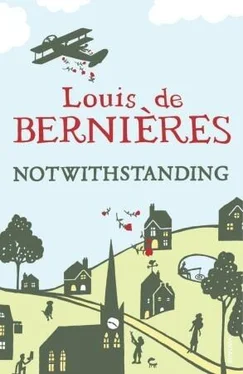Louis de Bernieres - Notwithstanding - Stories from an English Village
Здесь есть возможность читать онлайн «Louis de Bernieres - Notwithstanding - Stories from an English Village» весь текст электронной книги совершенно бесплатно (целиком полную версию без сокращений). В некоторых случаях можно слушать аудио, скачать через торрент в формате fb2 и присутствует краткое содержание. Год выпуска: 2010, Издательство: Vintage, Жанр: Современная проза, на английском языке. Описание произведения, (предисловие) а так же отзывы посетителей доступны на портале библиотеки ЛибКат.
- Название:Notwithstanding: Stories from an English Village
- Автор:
- Издательство:Vintage
- Жанр:
- Год:2010
- ISBN:нет данных
- Рейтинг книги:4 / 5. Голосов: 1
-
Избранное:Добавить в избранное
- Отзывы:
-
Ваша оценка:
- 80
- 1
- 2
- 3
- 4
- 5
Notwithstanding: Stories from an English Village: краткое содержание, описание и аннотация
Предлагаем к чтению аннотацию, описание, краткое содержание или предисловие (зависит от того, что написал сам автор книги «Notwithstanding: Stories from an English Village»). Если вы не нашли необходимую информацию о книге — напишите в комментариях, мы постараемся отыскать её.
is a funny and moving depiction of a charming vanished England.
Notwithstanding: Stories from an English Village — читать онлайн бесплатно полную книгу (весь текст) целиком
Ниже представлен текст книги, разбитый по страницам. Система сохранения места последней прочитанной страницы, позволяет с удобством читать онлайн бесплатно книгу «Notwithstanding: Stories from an English Village», без необходимости каждый раз заново искать на чём Вы остановились. Поставьте закладку, и сможете в любой момент перейти на страницу, на которой закончили чтение.
Интервал:
Закладка:
The shed door scrapes, and John is there, the wheel of the barrow protesting. ‘Hello, George, it’s me again. Lifted the onions, thought I’d better afore it rains, and you know what, George? It’s about this time I like the best; a bit of dew on the grass of a morning, wasps in the apples, not too hot, not too cold, making sandcastles full o’ parsnips and carrots, leaving beans on the stalk for seed, making nice tight onion grappes. It was Harold taught me that. Forty-five years ago. Blimey, all that time working here, man and boy. I wonder how many tons I’ve barrowed in my time, how many clods I’ve turned. And poor old Harold, went mad and died, and here I am, same age as him when he went. Makes you think, makes you pause, eh, George? I reckon it was all them garden chemicals. Went yellow, went mad, and died. That’s why I went organic. Maybe his missus poisoned him. Old sourpuss. And something else, George; I reckon our Sylvie’s taken a shine to our Alan.
‘I wouldn’t like to tell this to anyone else, but when I look at Sylvie I feel sad. Reminds me of everything I can’t have any more. Everything I’ve lost. Such a lovely girl,’ and here John feels the beginnings of tears at the corners of his eyes and cannot know whether it is because he is sad, or whether it is because he is sentimental, or because to him Sylvie is entirely beautiful. ‘Better go pick up some damsons,’ he decides at last, ‘it’s the season of jam, returned.’
The door scrapes, and John has gone. The door scrapes once more, and now Sylvie has come to lean on the earthy bench amid the flowerpots and morsels of string, and talk again with George. ‘Anyone at home? Hi, George, how’s it going? I’ve got to stop coming in here, I really have. I’m running out of excuses. Do you think I’m being too obvious? I mean, how am I supposed to make him notice me? Do you think he’s shy, or am I ugly, or what? And he’s off to university soon, and it’ll be too late. I’ve been watching him, he’s out on the patch where the lettuce was, digging it over, and throwing the worms to a thrush. I think that’s sweet, like John bringing you flies. And, while I’m here, you can tell me why big spiders only come out at apple time. I mean, one minute it’s summer, and there aren’t any spiders at all, and then the next minute it’s autumn, and you walk along the garden path first thing, and you get a face full of web, and you go, “Yikes, aaah,” and you flap your arms to get it off, and then your mum says, “Get some tomatoes, love,” and you find you can’t do it without making half a dozen whopping great spiders homeless …’
Out on the vegetable patch John is watching Alan, who is working twice as hard as before, as if to prove something to the older man. ‘That’s going well,’ says John, and Alan sighs and wipes his brow on his sleeve. ‘Hard work, though,’ he says.
‘This idea of yours about burying horseshit one foot deep is all very well, BUT.’
‘You’re young,’ says John. ‘Get strong now, it’ll never fail you later. Kettle on?’
‘Is it time?’
‘It’s always time,’ and so Alan thrusts the fork into the dark earth, and together they go to the shed, where Sylvie is talking to George. She straightens up at the scrape of the door, and Alan says, ‘Hi there, Sylv, what’s up?’
She turns and smiles, sheepish and sweet. ‘I’m skiving,’ she says, ‘you caught me.’
John is scraping the door, back and forth, back and forth, wondering why with time it hasn’t worn to a free movement. ‘You any good at carpentry, fixing things?’ he asks, and Alan is modest. ‘Not so bad. Why?’
‘That door’s got to be rehung, and while you’re at it, I reckon on a new lock. We don’t want thieves again.’
‘Thieves?’ repeats Alan. ‘Didn’t know we’d had ’em. What did they take?’
‘It were twenty year ago,’ says John, ‘didn’t I ever tell? And a right to-do it was, with the police up.’
‘But what did they take?’
‘They didn’t take anything, that’s the queer bit. They broke down the door, and it in’t never been right since, and then they dunged in the kettle.’
Sylvie gives a little squeak of horror, and Alan wrinkles his nose. ‘Dunged in the kettle?’ he says. ‘Oh my God, that’s horrible, I don’t believe it, in the kettle? That’s foul, it wasn’t this kettle, was it? I haven’t been drinking from it, have I?’
John savours Alan’s disquiet and Sylvie’s wide-eyed disgust and then reassures them. ‘Oh no, I emptied the muck on the compost, no point in wasting it, and then I boiled the kettle twice, and then I left it with bleach in all night. And then I boiled it every half-hour and kept emptying and refilling it, and then the next day, first thing, I made a cup o’ tea, and I sat here in this very same place, just lookin’ at it, lookin’ and lookin’ and lookin’, and then I thought, “Here goes,” and I raised it up to take a sip. But I couldn’t. I just sat here lookin’ at that cup o’ tea, thinkin’ I couldn’t do it, and then I threw it in the chrysanthemums. And then I threw away the kettle, but then later on I got the kettle out of the bin again, and I thought, “What a waste,” so I stuck it in the hedge. It’s still there if you care to take a look. And the next thing I knew it had some robins nestin’ in it, with five little speckledy chicks, and I used to take ’em a worm or two, and I’d stick my head in that hedge and I’d chuckle and say, “If only you knew what I know about what’s been in that kettle, you little sods wouldn’t likely be so perky.” And anyway, there’s been two broods in that kettle every year for twenty, and I reckon by now it might be all right for brewing with.’ John sits back and sucks his pipe, but it has gone out again, and he taps out the dottle on the edge of the bench.
‘But who’d do that?’ asks Sylvie, tossing the fair hair back from her eyes and over her shoulder, thankful to be part of this conversation, to be in the same shed as Alan and the old man. ‘Who’d break in and do a poo in the kettle? I mean, it’s a bit pointless, isn’t it?’
‘We never rightly knew,’ says John, ‘but I reckon it might have been Harold. The old head gardener afore me. Went mad enough, I reckon, to break in and do one in the kettle. Might have been them chrysanths. Nutty about chrysanths, he was. Had so many he couldn’t keep up. Worked all God’s hours, he did, and never could manage. It was the strain, see? And all them chemicals, more than likely. And he went potty, and anyway, there’s me coming into work one day, and lo and behold, there’s Harold’s wellies sticking up out of the rain barrel, and I have a look, and there’s Harold wearing the wellies, and he’s down in the barrel head first. And I pull him out, and I say, “Bloody hell, Harold, what do you think you’re a-doing of?” and he says, “I’m trying to drown myself, and now you’ve gone and buggered it up.” Anyway, they bunged him in the loony bin and when I go and see him, there he is, lying in bed, and all around him’s vases of his own chrysanths that drove him barmy in the first place.’
Sylvie grows waggish, her eyes sparkle, her voice has a tease in it. She catches Alan’s eye and laughs. ‘The gardeners here are always mad, it’s a tradition.’
John growls, ‘Cheeky scallywag,’ and then he reflects, ‘You know the sad thing? The first time I put that kettle in the hedge, it filled up with water from the rain, and the chicks all drowned stone dead and sodden, poor little beggars, so I cleaned it out and put it back with the spout downwards, so it wouldn’t happen no more, and I gave the chicks to the ferret, so’s at least they weren’t wasted.’ John remembers his regret at the death of the chicks, and stuffs his pipe from the greasy pouch he has had since before the war. ‘Or it might not’ve been Harold,’ he continues, ‘we never rightly knew. But I’ll tell you one thing; I said to the police, “You take that manure away and get it analysed, and you’ll find out everything there is to know about him who did it. Blood group, what he ate, everything. Do a forensic on it,” I says, “and then when a suspect turns up, you wait ’til he manures again, and you match it up, and you’ve got your man.” And the copper, it was Arthur Diss was the bobby back then, he says, “Come off it, John, it in’t that serious,” and I say, “Listen, son, if someone broke into your cop shop and dunged in your kettle, you’d think it was bloody serious,” and he laughs and says, “So I would, so I would, but I’m not takin’ that away and havin’ it analysed. I’ve analysed it already and I can tell what it is.” Anyway, I don’t know who it were, but I’ve an idea it was an Iranian. One o’ them Persian johnnies.’
Читать дальшеИнтервал:
Закладка:
Похожие книги на «Notwithstanding: Stories from an English Village»
Представляем Вашему вниманию похожие книги на «Notwithstanding: Stories from an English Village» списком для выбора. Мы отобрали схожую по названию и смыслу литературу в надежде предоставить читателям больше вариантов отыскать новые, интересные, ещё непрочитанные произведения.
Обсуждение, отзывы о книге «Notwithstanding: Stories from an English Village» и просто собственные мнения читателей. Оставьте ваши комментарии, напишите, что Вы думаете о произведении, его смысле или главных героях. Укажите что конкретно понравилось, а что нет, и почему Вы так считаете.












